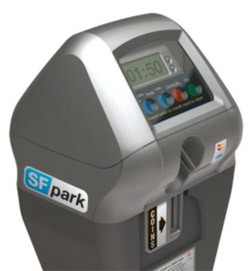San Francisco Tests Smart Parking Systems

In large cities, there are always no places for parking a car - of course, not everywhere, but in the most popular places. They tried to solve the problem several times, but so far without success. And so, the San Francisco authorities firmly decided to tackle this problem, proposing their own plan for "salvation." In San Francisco, new parking systems will soon be installed that are significantly different from conventional devices. Not only that, such a system, called SFpark, allows you to pay for parking time with a credit card, but also independently assesses the level of workload of the parking / parking block, setting individual prices.
Yes, the “smart” machine, thanks to special sensors, really allows you to evaluate the load of a particular parking at different times of the day. Then, the remaining number of free spaces is calculated, and for especially busy parking lots, the price rises. Thus, the cost of an hour of parking in various places can range from 25 cents to 6 US dollars. Monitoring of congestion is carried out constantly, so if the parking is usually popular during a certain period, then the prices there will be as low as somewhere on the outskirts.
San Francisco authorities promise that after the introduction of smart systems, the cost of an hour of parking will not go up significantly in relation to previous “hard” tariffs - the maximum “smart” price can exceed the “hard” price by 50 cents. True, this will be from the very beginning, then changes are possible.
By the way, SFpark automatic devices not only take money from motorists, but also provide information on congestion of parking lots for the entire city. Moreover, to get this information, it is enough to register in the system, and access to the database can be obtained even through a mobile device (including the number of free spaces in a certain parking / parking lot and the hourly rate here). Such a scheme of work will still allow saving. For example, not to park the car in the most “expensive” region, but to park it two blocks from this place, thus saving a lot of money.
In principle, if the system really saves, motorists will appreciate such a scheme, because now time losses due to the need to find free parking / parking will be excluded. If the project will work, and work well, the experience will be transferred to other locations in the United States.
A source
